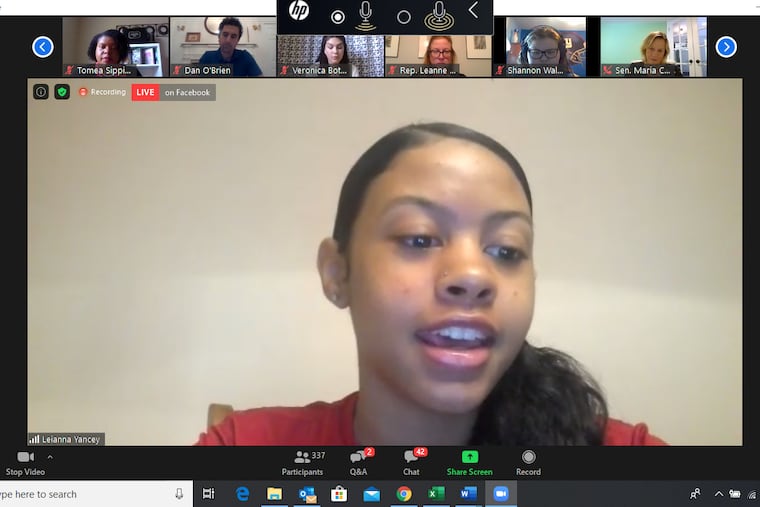Teens across the Philadelphia region speak out on racism in virtual town hall
“Why are police killing unarmed black men and getting away with it?" asked Gabe Peay, a student at East Norriton Middle School.

Kayla Cocci, a 17-year-old biracial student at Ridley High School, said many of the white people in her life “don’t see color” — and don’t understand the challenges she and her brother face.
Seif Ghazi, 17, of Radnor High School, said he felt self-conscious and isolated when a math teacher seated him next to another student of color and repeatedly made jokes that the two would “look good together as a couple.”
Kramoh Mansalay, who just graduated from Academy Park High School, said that as a black male, he “could be George Floyd,” and that he was participating in community cleanups, joining protests, and signing petitions — so that “when the history books are written, I’m on the right side of that.”
They were some of the teenagers from across the region who participated in a virtual town hall event Friday, voicing their experiences with race and racism — and pressing leaders, as well as their peers, to do more to address problems.
“Why are police killing unarmed black men and getting away with it?" asked Gabe Peay, a student at East Norriton Middle School, who said he had watched the video of Floyd’s killing by Minneapolis police.
Hosted by Public Citizens for Children and Youth, a Philadelphia nonprofit advocacy group, the virtual event aimed to give young people a chance to discuss race — a conversation “often so painful that adults can’t talk about it,” said PCCY’s education policy director, Tomea Sippio-Smith — amid the protests that have swept the nation in the wake of Floyd’s death last month.
» READ MORE: ‘We did not come this far to give up’: 13,000 members of the Class of 2020 and a ceremony they never expected
It also featured elected officials fielding questions on their efforts to achieve racial justice and what students could do to further the cause.
“You’re never too young to bring about change,” said U.S. Sen. Bob Casey (D., Pa.), noting that Georgia Congressman John Lewis became a civil-rights leader in the 1960s after getting involved in the movement as a teenager. He advised students to “start with those around you," and also encouraged them to support recently introduced federal legislation that would ban choke holds by police, create a national database to track officer misconduct, and implement other reforms.
“We have a moment here in American history that we’re living through, that is unlike any moment of its kind in the last 50 years,” Casey said. “And it’s a moral moment.”
Other questions from students focused on ending systemic racism in Congress and defunding police.
U.S. Rep. Madeleine Dean, a Montgomery County Democrat, said she preferred “right-funding the police,” and said leaders needed to invest money in other priorities, including education and housing.
Fellow U.S. Rep. Dwight Evans, a Philadelphia Democrat, urged students to “get to know people who are not like you" — though he cautioned against assuming “because someone looks like you that they understand about inclusion."
“If that person is not woke, you can educate them,” Evans said.
» READ MORE: Chester County school board president resigns after joke about George Floyd’s death
Teenagers said they had already been having difficult conversations about race with people in their lives. Michelle Waksman, 18, of Pennsbury High School, said she has tried to explain to her Jewish family members why it’s a “double standard” to call out anti-Semitism but not other forms of discrimination.
Kelly Meinert, 18, of Central Bucks High School East, said she had spoken out during sophomore year against racism she was seeing on her soccer team and was shunned as a result. While “it was hard," said Meinert, who is white, “I got through it because I knew I was doing the right thing.”
Nya Jarbah, a black student who recently graduated from Lower Merion High School and helped organize a protest in honor of Floyd, said that while many of her peers already know she is “usually outspoken” on issues involving race, she has had to reach out to people with different views.
“If you call me your friend, you have to at least believe my life matters just as much as yours,” she said.